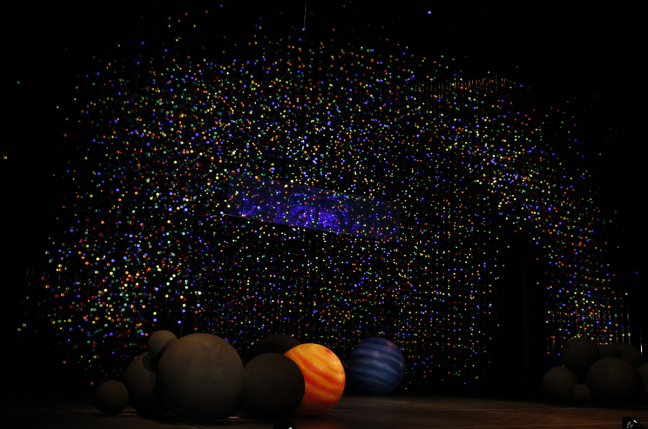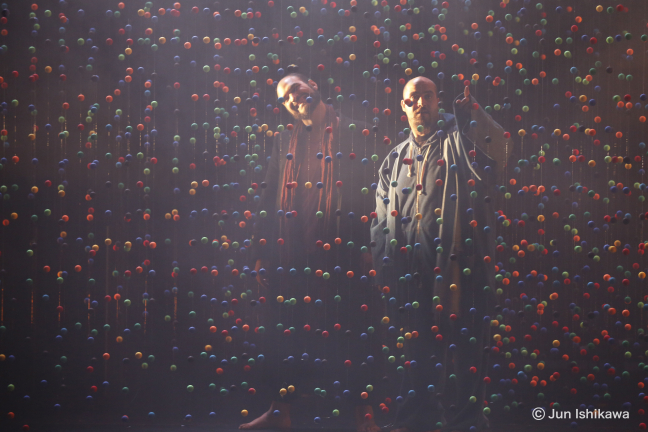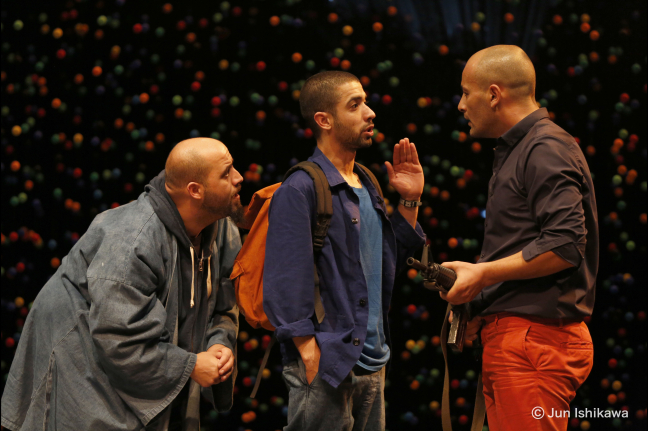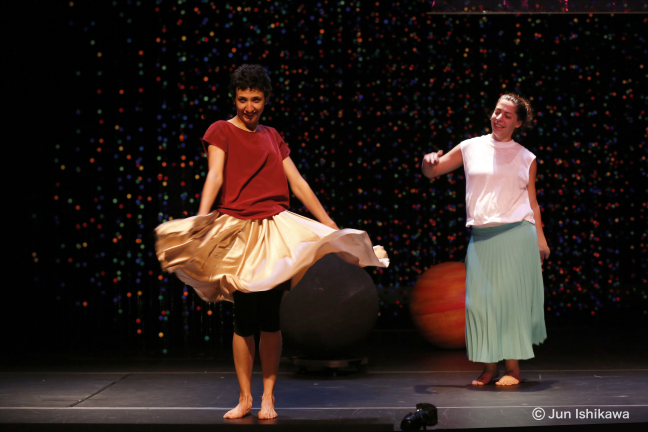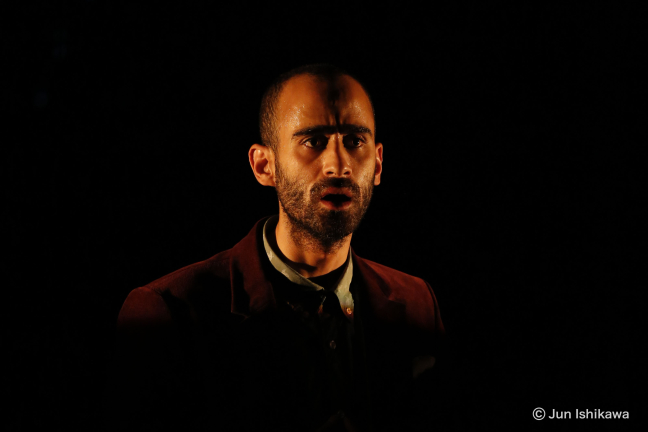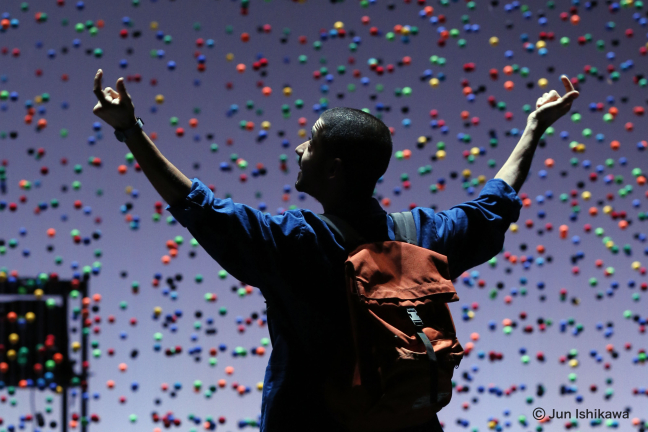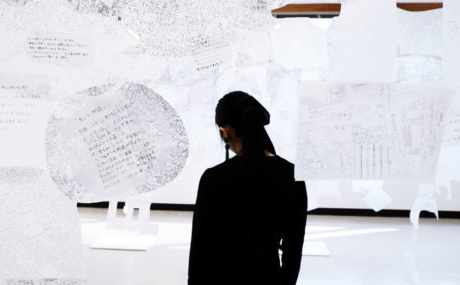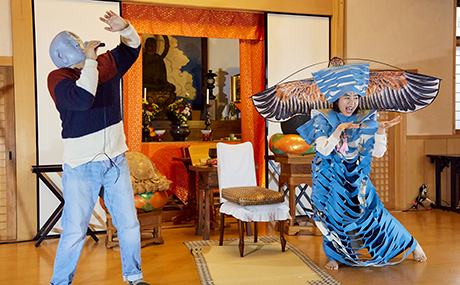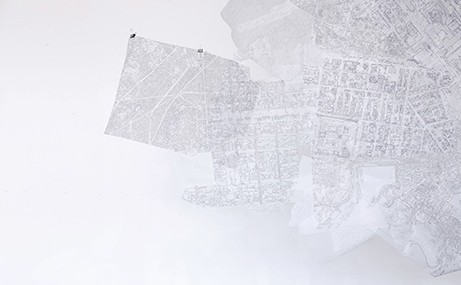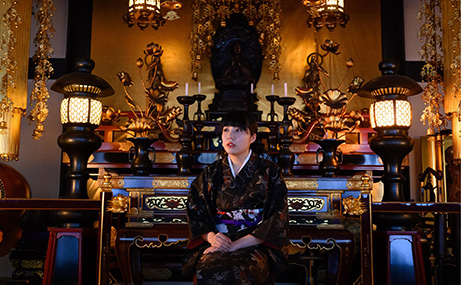Rashomon
Festival/Tokyo 14 - Main program
This co-production with Al-Kasaba Theatre (Palestine) was one of the main programs of Festival/Tokyo 2014. Japanese staff took charge of the original story, direction, dramaturgy, stage design, choreography and overall technical coordination, while Palestinians took their part as the cast, as well as in lighting design and music selection. The original texts of the play were Japanese author Ryunosuke Akutagawa’s Rashomon and Yabunonaka (In the Groves), based on Konjaku Monogatari (Anthology of Tales from the Past). Akira Kurosawa’s internationally-acclaimed film Rashomon was created from the two short stories, and was later adapted to a Broadway stage production. The script of that play was translated into Arabic, which, via Palestine, finally met Japan again. This production is a new adaptation of all the above-mentioned materials. Its background story represents the very encounter between Palestinian artists and the Japanese audience. The play questions: Can we say the Japanese are not contributing to the continuing occupation of Palestine? Problems that aggravate further by feeding on people’s ignorance, indifference and disregard appear on stage as the ‘grove’. The play depicts a utopia which runs counter to reality, where everybody ends up confessing that he/she is the culprit.
>>Click here to view pamphlet (Japanese)
>>Click here to view English translation
Artistic Director: George Ibrahim (Al-Kasaba Theatre)
Direction: Yukari Sakata
Stage Design: Mé
Dramaturg: Kaku Nagashima
Based on “Rashomon” and “In A Grove” (Yabu no naka) by Ryunosuke Akutagawa / Also inspired by “Rashomon” (screenplay) by Akira Kurosawa, Shinobu Hashimoto; “Rashomon” (play) by Fay Kanin, Michael Kanin
Quotation from “A horse for the stranger. To an Iraqi Poet” by Mahmoud Darwish (translated by Inuhiko Yomota) / Songs: “Nijmet El-Subeh”, “Inta Bne-Meen”, “La Tetlaa’i” (from “Ishraq Reminiscence” by Sanaa Moussa)
Cast: Adeeb Safadi, Atta Nasser, Henry Andrawes, Husam Al-Azza, Muayad A. Samad, Shams Assi, Yasmin Qadmany
Lighting: Mu’az Al Ju’beh / Music Selection: Zaher Rashmawy / Sound: Akira Aikawa (Sound Weeds Inc.) / Sound Operation: Shinichi Hatakeyama / Choreography: Yukina Sakai / Costumes: Kyoko Fujitani (FAIFAI) / Stage Design Production: Shunsuke Sakurai / Stage Design Production Assistants: Akira Ushiyama, Zyun Ichikawa, Mitsumasa Moriya, Yuka Obata, Erika Hiki, Masataka Nochi, Tomoe Naobayashi, Naohiro Yoshida
Technical Manager: Eiji Torakawa / Assistant Technical Manager: Yukiko Kato / Stage Manager: Go Sato / Stage Assistant: Ryo Okubo / Stage Design Co-ordination: Tomomi Nakamura / Lighting Co-ordination: Makiko Sasaki (Factor Co., Ltd.) / Sound Co-ordination: Akira Aikawa (Sound Weeds Inc.) /
Subtitles: Satoru Makuuchi / Arabic Script Adaptation: George Ibrahim (Al-Kasaba Theatre) / Translation, Interpretation: Kotone Hashimoto, Maho Watanabe / Technical Interpretation: Noriko Yamada
Production Co-ordination: Chika Kawai, Shiori Sunagawa
Planning: George Ibrahim (Al-Kasaba Theatre), Festival/Tokyo
Produced and presented by: Festival/Tokyo
Story
The Journalist takes shelter from the rain under Rashomon Gate. The Guard appears and asks him to show a permit. They are joined by the Wigmaker, who lives in the gate, and the three start a conversation about a murder case reported on the morning newspaper. A dead man’s body was found in the groves; everyone concerned testified that they killed him. Faced with the obscured truth, even the three under Rashomon Gate eventually start to confess. The chaotic situation ends, suddenly, with Palestinian poet Mahmoud Darwish’s words.
